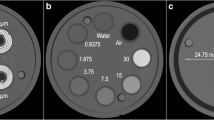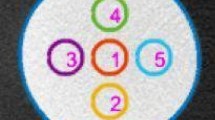Abstract
Previous studies suggests that cone beam computerized tomography (CBCT) images could provide reliable information regarding the fate of bone grafts in the maxillofacial region, but no systematic information regarding the standardization of CBCT settings and properties is available, i.e., there is a lack of information on how the images were generated, exported, and analyzed when bone grafts were evaluated. The aim of this study was to (1) do a systematic review on which type of CBCT-based DICOM images have been used for the evaluation of the fate of bone grafts in humans and (2) use a software suggested in the literature to test DICOM-based data sets, exemplifying the effect of variation in selected parameters (windowing/contrast control, plane definition, slice thickness, and number of measured slices) on the final image characteristics. The results from review identified three publications that used CBCT to evaluate maxillofacial bone grafts in humans, and in which the methodology/results comprised at least one of the expected outcomes (image acquisition protocol, image reconstruction, and image generation information). The experimental shows how the influence of information that was missing in the retrieved papers, can influence the reproducibility and the validity of image measurements. Although the use of CBCT-based images for the evaluation of bone grafts in humans has become more common, this does not reflect on a better standardization of the developed studies. Parameters regarding image acquisition and reconstruction, while important, are not addressed in the proper way in the literature, compromising the reproducibility and scientific impact of the studies.





Similar content being viewed by others
References
Esposito M, Hirsch JM, Lekholm U, Thomsen P: Biological factors contributing to failures of osseointegrated oral implants. (I). Success criteria and epidemiology. Eur J Oral Sci 106:527–551, 1998
Buser D, Dula K, Hess D, et al: Localized ridge augmentation with autografts and barrier membranes. Periodontol 19:151–163, 2000
Bauer TW, Muschler GF: Bone graft materials. An overview of the basic science. Clin Orthop Relat Res 371:10–27, 2000
Eppley BL, Pietrzak WS, Blanton MW: Allograft and alloplastic bone substitutes: a review of science and technology for the craniomaxillofacial surgeon. J Craniofac Surg 16:981–989, 2005
Giannoudis PV, Dinopoulos H, Tsiridis E: Bone substitutes: an update. Injury 36(Suppl 3):20–27, 2005
Ehrhart N, Kraft S, Conover D, Rosier RN, Schwarz EM: Quantification of massive allograft healing with dynamic contrast enhanced-MRI and cone beam-CT: a pilot study. Clin Orthop Relat Res 466:1897–1904, 2008
Grauer D, Cevidanes LS, Proffit WR: Working with DICOM craniofacial images. Am J Orthod Dentofacial Orthop 136:460–470, 2009
Peck D: Digital Imaging and Communications in Medicine (DICOM): a practical introduction and survival guide. J Nucl Med 50:1384, 2009
De Vos W, Casselman J, Swennen GR: Cone-beam computerized tomography (CBCT) imaging of the oral and maxillofacial region: a systematic review of the literature. Int J Oral Maxillofac Surg 38:609–625, 2009
Honma K, Kobayashi T, Nakajima T, Hayasi T: Computed tomographic evaluation of bone formation after secondary bone grafting of alveolar clefts. J Oral Maxillofac Surg 57:1209–1213, 1999
Johansson B, Grepe A, Wannfors K, Hirsch JM: A clinical study of changes in the volume of bone grafts in the atrophic maxilla. Dentomaxillofac Radiol 30:157–161, 2001
Verdugo F, Simonian K, Smith McDonald R, Nowzari H: Quantitation of mandibular ramus volume as a source of bone grafting. Clin Implant Dent Relat Res 11(Suppl 1):e32–37, 2009
Lai RF, Zou H, Kong WD, Lin W: Applied anatomic site study of palatal anchorage implants using cone beam computed tomography. International Journal of Oral Science 2:98–104, 2010
Swennen GR, Schutyser F: Three-dimensional cephalometry: spiral multi-slice vs cone-beam computed tomography. Am J Orthod Dentofacial Orthop 130:410–416, 2006
Cevidanes LH, et al: Three-dimensional surgical simulation. Am J Orthod Dentofacial Orthop 138:361–371, 2010
Ganz SD: Bone grafting assessment: focus on the anterior and posterior maxilla utilizing advanced 3-D imaging technologies. Dent Implantol Update 20:41–48, 2009
Fatemitabar SA, Nikgoo A: Multichannel computed tomography versus cone-beam computed tomography: linear accuracy of in vitro measurements of the maxilla for implant placement. Int J Oral Maxillofac Implants 25:499–505, 2010
Verdugo F, Simonian K, D'Addona A, Ponton J, Nowzari H: Human bone repair after mandibular symphysis block harvesting: a clinical and tomographic study. J Periodontol 81:702–709, 2010
Block MS, Haggerty CJ: Interpositional osteotomy for posterior mandible ridge augmentation. J Oral Maxillofac Surg 67:31–39, 2009
Takane M, et al: Clinical application of cone beam computed tomography for ideal absorbable membrane placement in interproximal bone defects. J Oral Sci 52:63–69, 2010
Blake FA, Blessmann M, Pohlenz P, Heiland M: A new imaging modality for intraoperative evaluation of sinus floor augmentation. Int J Oral Maxillofac Surg 37:183–185, 2008
Heiland M, et al: Navigated implantation after microsurgical bone transfer using intraoperatively acquired cone-beam computed tomography data sets. Int J Oral Maxillofac Surg 37:70–75, 2008
Lopes N, Oliveira DM, Vajgel A, Pita I, Bezerra T, Vasconcellos RJ: A new approach for reconstruction of a severely atrophic mandible. J Oral Maxillofac Surg 67:2455–2459, 2009
Gapski R, et al: Histological, histomorphometric, and radiographic evaluation of a sinus augmentation with a new bone allograft: a clinical case report. Implant Dent 17:430–438, 2008
Hamada Y, et al: Application of limited cone beam computed tomography to clinical assessment of alveolar bone grafting: a preliminary report. Cleft Palate Craniofac J 42:128–137, 2005
Oberoi S, Chigurupati R, Gill P, Hoffman WY, Vargervik K: Volumetric assessment of secondary alveolar bone grafting using cone beam computed tomography. Cleft Palate Craniofac J 46:503–511, 2009
Esposito M, Hirsch JM, Lekholm U, Thomsen P: Biological factors contributing to failures of osseointegrated oral implants. (II). Etiopathogenesis. Eur J Oral Sci 106:721–764, 1998
Goldberg VM, Stevenson S: Natural history of autografts and allografts. Clin Orthop Relat Res 225:7–16, 1987
Chadwick JW, Lam EW: The effects of slice thickness and interslice interval on reconstructed cone beam computed tomographic images. Oral Surg Oral Med Oral Pathol Oral Radiol Endod 110:e37–42, 2010
de Oliveira MG, Morais LE, Silva DN, de Oliveira HW, Heitz C, Gaiao L: Is 3D-CT reformation using free software applicable to diagnosis of bone changes in mandibular condyles? J Appl Oral Sci 17:166–169, 2009
Gibaud B: The quest for standards in medical imaging. Eur J Radiol, 2010. doi:10.1016/j.ejrad.2010.05.003
van Vlijmen OJ, Rangel FA, Berge SJ, et al: Measurements on 3D models of human skulls derived from two different cone beam CT scanners. Clin Oral Investig, 2010. doi:10.1007/s00784-010-0440-8
Ludlow JB, Ivanovic M: Comparative dosimetry of dental CBCT devices and 64-slice CT for oral and maxillofacial radiology. Oral Surg Oral Med Oral Pathol Oral Radiol Endod 106:106–114, 2008
Ludlow JB, Davies-Ludlow LE, Brooks SL, Howerton WB: Dosimetry of 3 CBCT devices for oral and maxillofacial radiology: CB Mercuray, NewTom 3G and i-CAT. Dentomaxillofac Radiol 35:219–226, 2006
Yeni YN, Christopherson GT, Dong XN, Kim DG, Fyhrie DP: Effect of microcomputed tomography voxel size on the finite element model accuracy for human cancellous bone. J Biomech Eng 127:1–8, 2005
Mah P, Reeves TE, McDavid WD: Deriving Hounsfield units using grey levels in cone beam computed tomography. Dentomaxillofac Radiol 39:323–335, 2010
Schlueter B, Kim KB, Oliver D, Sortiropoulos G: Cone beam computed tomography 3D reconstruction of the mandibular condyle. Angle Orthod 78:880–888, 2008
Lagravere MO, Major PW, Carey J: Sensitivity analysis for plane orientation in three-dimensional cephalometric analysis based on superimposition of serial cone beam computed tomography images. Dentomaxillofac Radiol 39:400–408, 2010
Acknowledgments
This study was financed by the Brazilian agencies Fapesp (2008/09207-9), CAPES and CNPq.
Author information
Authors and Affiliations
Corresponding author
Rights and permissions
About this article
Cite this article
Spin-Neto, R., Marcantonio, E., Gotfredsen, E. et al. Exploring CBCT-Based DICOM Files. A Systematic Review on the Properties of Images Used to Evaluate Maxillofacial Bone Grafts. J Digit Imaging 24, 959–966 (2011). https://doi.org/10.1007/s10278-011-9377-y
Published:
Issue Date:
DOI: https://doi.org/10.1007/s10278-011-9377-y




